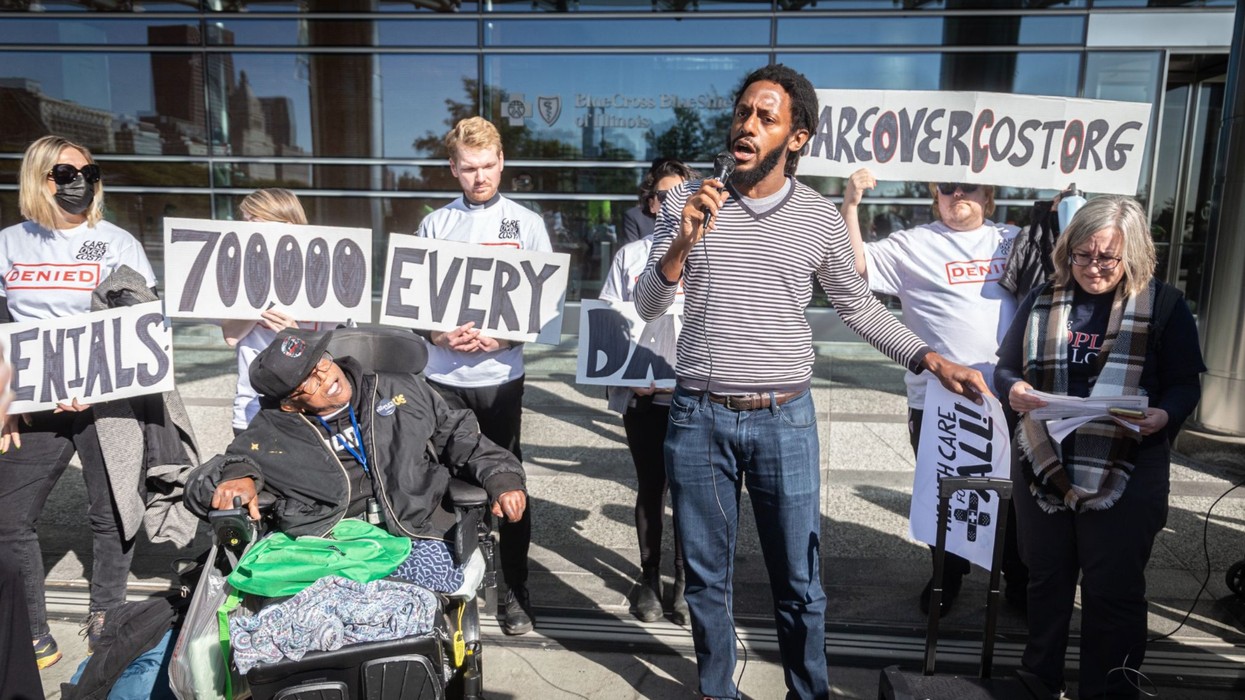Activists implored AHIP and private health insurance corporations including Blue Cross Blue Shield (BCBS), UnitedHealthcare, Cigna, Humana, and Aetna "focus on ending the epidemic of care denials."
"CEOs at private health insurance companies profit off our pain and deny our healthcare. That's why people are rising up across the country to expose the lie that private health insurers are there for us when we need them," People's Action Healthcare for All campaign director Aija Nemer-Aanerud said in a statement.
"We all deserve the care we need when we need it, and it's time for greedy corporations like BCBS, Aetna, Cigna, and UnitedHealthcare to pay up and stop denying care," Nemer-Aanerud added.
According to Care Over Cost, private insurers deny more than 248 million claims and pre-authorization requests each year.
The campaign's demands include "sharing claims denial data, holding public meetings, ceasing lobbying, and working with policymakers and public authorities to transform the system to people over profit."
In Chicago, activists from groups including the People's Lobby, ONE Northside, and Jane Addams Senior Caucus held a "die-in" demonstration outside the downtown office of BlueCross BlueShield in support of what the organizers said are "the 700,000 Americans whose lives are impacted or lost due to lack of access to medical care from denied medical claims each day."
Activist Michael Grice, who lives with a disability, told rally attendees that "it took me over four years to get the wheelchair I'm sitting in now."
"I'm tired of insurance companies putting profit over people," Grice said. "They always do it for people with disabilities and senior citizens. I'm fed up with this garbage."
Illinois state Sen. Mike Simmons (D-7) addressed the Chicago rally, asserting that "it's not too much to ask in a developed democracy that people live long, healthy, prosperous lives."
"Those 700,00 denied claims—that's someone who needs insulin, someone who has an untreated liver condition," Simmons said. "That's somebody's aunt, somebody's mom."
Hartford rally attendee Kristen Whitney Daniels toldCT Insider: "This is an untenable situation. And it's only getting worse and worse every year, getting less and less covered."
"The frustrations are gonna boil over eventually," she added. "And [insurers] can either be part of the solution and working with patients to find ways to help patients have health, or they can be a part of the problem."
Responding to the protests, Alex Kepnes, executive director of communications for Aetna, toldCT Insider that the company wants to be "part of the solution."
"We believe that every American should have access to affordable, high-quality health coverage," Kepnes said. "The basic premise of making healthcare more affordable and simpler is at the core of CVS Health's transformation."
CVH Health, which owns Aetna, reported revenue of over $300 billion last year, with profits topping $4 billion—even as the company plans to lay off 500 Connecticut employees.
Daniels, who has Type 1 diabetes and other healthcare needs, said her insurance company, UnitedHealth, is part of the problem, making it extremely difficult to get the insulin she needs. She also said the company stopped covering one medication she needs a year after it was approved for coverage.
"I am tired of insurance companies getting rich off treating patients and disabled folks, like myself, as if we are expendable."
"The problem is this medication has worked so well for the last two years," Daniels said. "So I know how well it works. And then I want it and then I've been off of it for the last few months. And it's been horrible. It's like relearning to be diabetic again."
"I am tired of insurance companies getting rich off treating patients and disabled folks, like myself, as if we are expendable. I am not alone," she added. "That's why I am fighting and I will keep on fighting these claims and for affordable insurance that everyone has access to."
Phil Brewer, an emergency physician representing the single-payer healthcare advocacy group Physicians for a National Health Program (PNHP) at the Hartford rally, told CT Insider that "requiring pre-authorization used to be rare."
"Now it's routine," he added. "It also used to be that a human being actually reviewed the request, but now most requests are 'reviewed' by algorithm-driven AI programs."
At the Portland rally, Ronan Aubrey—whose family has a history of cancer—said they were surprised to receive a bill for a diagnostic ultrasound they thought would be covered by their insurance.
"Because my procedure was recommended by a doctor, I had assumed it would be fully covered. I was wrong," Aubrey told the Maine Beacon. "My insurer only covered a small part of the scan and procedure because I hadn't yet met my $3,500 deductible for the year."
"When an insurer tells us that medical care we need isn't covered, what are we going to do?" Aubrey asked. "My insurer shouldn't be deciding whether I should be getting a medical procedure—my doctor should."



